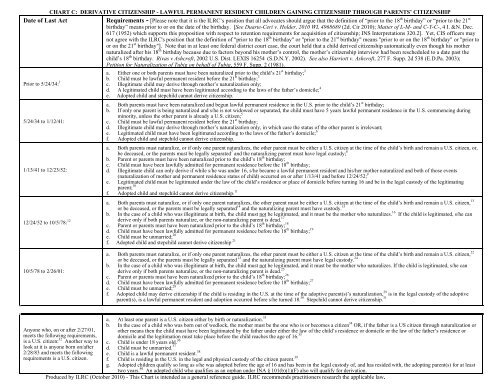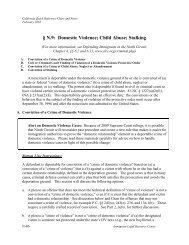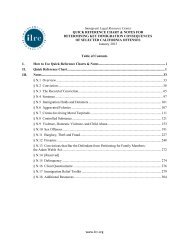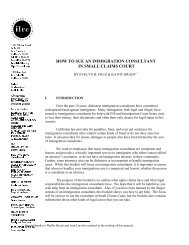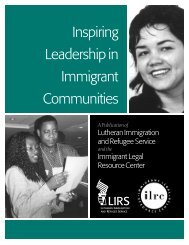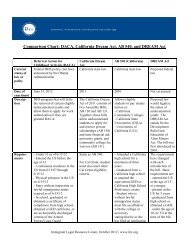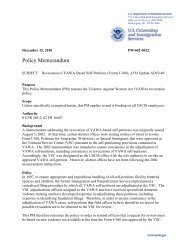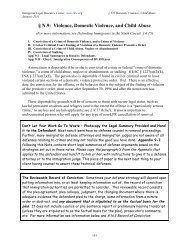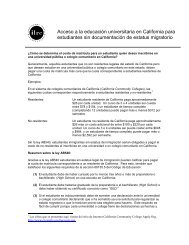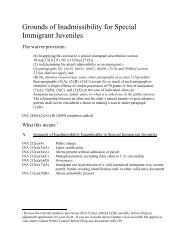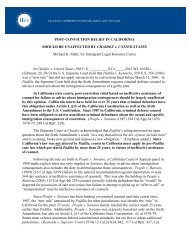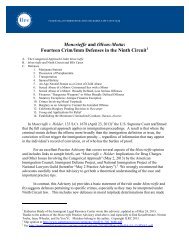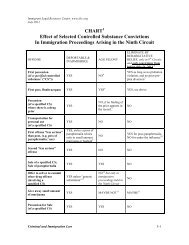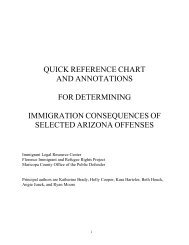Chart C: Derivative Citizenship - ILRC
Chart C: Derivative Citizenship - ILRC
Chart C: Derivative Citizenship - ILRC
You also want an ePaper? Increase the reach of your titles
YUMPU automatically turns print PDFs into web optimized ePapers that Google loves.
CHART C: DERIVATIVE CITIZENSHIP - LAWFUL PERMANENT RESIDENT CHILDREN GAINING CITIZENSHIP THROUGH PARENTS’ CITIZENSHIP<br />
Date of Last Act<br />
Requirements - [Please note that it is the <strong>ILRC</strong>’s position that all advocates should argue that the definition of “prior to the 18 th birthday” or “prior to the 21 st<br />
birthday” means prior to or on the date of the birthday. [See Duarte-Ceri v. Holder, 2010 WL 4968689 (2d. Cir 2010); Matter of L-M- and C-Y-C-, 4 I. &N. Dec.<br />
617 (1952) which supports this proposition with respect to retention requirements for acquisition of citizenship; INS Interpretations 320.2]. Yet, CIS officers may<br />
not agree with the <strong>ILRC</strong>'s position that the definition of "prior to the 18 th birthday" or "prior to the 21 st birthday" means "prior to or on the 18 th birthday" or "prior to<br />
or on the 21 st birthday"]. Note that in at least one federal district court case, the court held that a child derived citizenship automatically even though his mother<br />
naturalized after his 18 th birthday because due to factors beyond his mother’s control, the mother’s citizenship interview had been rescheduled to a date past the<br />
child’s 18 th birthday. Rivas v Ashcroft, 2002 U.S. Dist. LEXIS 16254 (S.D.N.Y. 2002). See also Harriott v. Ashcroft, 277 F. Supp. 2d 538 (E.D.Pa. 2003);<br />
Petition for Naturalization of Tubig on behalf of Tubig, 559 F. Supp. 2 (1981).<br />
a. Either one or both parents must have been naturalized prior to the child’s 21 st birthday; 2<br />
b. Child must be lawful permanent resident before the 21 st birthday; 3<br />
Prior to 5/24/34: 1 c. Illegitimate child may derive through mother’s naturalization only;<br />
d. A legitimated child must have been legitimated according to the laws of the father’s domicile; 4<br />
e. Adopted child and stepchild cannot derive citizenship.<br />
5/24/34 to 1/12/41:<br />
1/13/41 to 12/23/52:<br />
a. Both parents must have been naturalized and begun lawful permanent residence in the U.S. prior to the child’s 21 st birthday;<br />
b. If only one parent is being naturalized and s/he is not widowed or separated, the child must have 5 years lawful permanent residence in the U.S. commencing during<br />
minority, unless the other parent is already a U.S. citizen; 5<br />
c. Child must be lawful permanent resident before the 21 st birthday;<br />
d. Illegitimate child may derive through mother’s naturalization only, in which case the status of the other parent is irrelevant;<br />
e. Legitimated child must have been legitimated according to the laws of the father’s domicile; 6<br />
f. Adopted child and stepchild cannot derive citizenship.<br />
a. Both parents must naturalize, or if only one parent naturalizes, the other parent must be either a U.S. citizen at the time of the child’s birth and remain a U.S. citizen, or,<br />
be deceased, or the parents must be legally separated 7 and the naturalizing parent must have legal custody; 8<br />
b. Parent or parents must have been naturalized prior to the child’s 18 th birthday;<br />
c. Child must have been lawfully admitted for permanent residence before the 18 th birthday;<br />
d. Illegitimate child can only derive if while s/he was under 16, s/he became a lawful permanent resident and his/her mother naturalized and both of those events<br />
(naturalization of mother and permanent residence status of child) occurred on or after 1/13/41 and before 12/24/52; 9<br />
e. Legitimated child must be legitimated under the law of the child’s residence or place of domicile before turning 16 and be in the legal custody of the legitimating<br />
parent; 10<br />
f. Adopted child and stepchild cannot derive citizenship. 11<br />
12/24/52 to 10/5/78: 12 c. derive only if both parents naturalize, or the non-naturalizing parent is dead. 17<br />
Parent or parents must have been naturalized prior to the child’s 18 th birthday; 18<br />
a. Both parents must naturalize, or if only one parent naturalizes, the other parent must be either a U.S. citizen at the time of the child’s birth and remain a U.S. citizen, 13<br />
or be deceased, or the parents must be legally separated 14 and the naturalizing parent must have custody. 15<br />
b. In the case of a child who was illegitimate at birth, the child must not be legitimated, and it must be the mother who naturalizes. 16 If the child is legitimated, s/he can<br />
d. Child must have been lawfully admitted for permanent residence before the 18 th birthday; 19<br />
e. Child must be unmarried; 20<br />
f. Adopted child and stepchild cannot derive citizenship 21<br />
10/5/78 to 2/26/01:<br />
a. Both parents must naturalize, or if only one parent naturalizes, the other parent must be either a U.S. citizen at the time of the child’s birth and remain a U.S. citizen, 22<br />
or be deceased, or the parents must be legally separated 23 and the naturalizing parent must have legal custody. 24<br />
b. In the case of a child who was illegitimate at birth, the child must not be legitimated, and it must be the mother who naturalizes. If the child is legitimated, s/he can<br />
derive only if both parents naturalize, or the non-naturalizing parent is dead. 25<br />
c. Parent or parents must have been naturalized prior to the child’s 18 th birthday; 26<br />
d. Child must have been lawfully admitted for permanent residence before the 18 th birthday; 27<br />
e. Child must be unmarried; 28<br />
f. Adopted child may derive citizenship if the child is residing in the U.S. at the time of the adoptive parent(s)’s naturalization, 29 is in the legal custody of the adoptive<br />
parent(s), is a lawful permanent resident and adoption occurred before s/he turned 18. 30 Stepchild cannot derive citizenship. 31<br />
Anyone who, on or after 2/27/01,<br />
meets the following requirements,<br />
is a U.S. citizen: 32 Another way to<br />
look at it is anyone born on/after<br />
2/28/83 and meets the following<br />
requirements is a U.S. citizen.<br />
a. At least one parent is a U.S. citizen either by birth or naturalization. 33<br />
b. In the case of a child who was born out of wedlock, the mother must be the one who is or becomes a citizen 34 OR, if the father is a US citizen through naturalization or<br />
other means then the child must have been legitimated by the father under either the law of the child’s residence or domicile or the law of the father’s residence or<br />
domicile and the legitimation must take place before the child reaches the age of 16. 35<br />
c. Child is under 18 years old. 36<br />
d. Child must be unmarried. 37<br />
e. Child is a lawful permanent resident. 38<br />
f. Child is residing in the U.S. in the legal and physical custody of the citizen parent. 39<br />
g. Adopted children qualify so long as s/he was adopted before the age of 16 and has been in the legal custody of, and has resided with, the adopting parent(s) for at least<br />
two years. 40 An adopted child who qualifies as an orphan under INA § 101(b)(1)(F) also will qualify for derivation.<br />
Produced by <strong>ILRC</strong> (October 2010) - This <strong>Chart</strong> is intended as a general reference guide. <strong>ILRC</strong> recommends practitioners research the applicable law.
Endnotes for <strong>Chart</strong> C: 1 Prior to 1907 a mother could transmit citizenship only if she was divorced or widowed. See DANIEL LEVY, U.S. CITIZENSHIP AND<br />
NATURALIZATION HANDBOOK (Thomson West).<br />
2 It is the <strong>ILRC</strong>’s position, and the <strong>ILRC</strong> believes that all advocates should argue, that the definition of “prior to the 18 th birthday” or “prior to the 21 st birthday”<br />
means prior to or on the date of the birthday. See Duarte-Ceri v. Holder, 2010 WL 4968689 (2d. Cir 2010); Matter of L-M- and C-Y-C-, 4 I. &N. Dec. 617 (1952)<br />
which supports this proposition with respect to retention requirements for acquisition of citizenship; but, see also INS Interpretations 320.2. Yet, CIS officers<br />
may not agree with the <strong>ILRC</strong>'s position that the definition of "prior to the 18 th birthday" or "prior to the 21 st birthday" means "prior to or on the 18 th birthday" or<br />
"prior to or on the 21 st birthday."<br />
3 Prior to 1907 the child could take up residence in the U.S. after turning 21 years of age. See DANIEL LEVY, U.S. CITIZENSHIP AND NATURALIZATION<br />
HANDBOOK (Thomson West) (citing Sec. 5, Act of March 2, 1907).<br />
4 Legitimation could take place before or after the child turns 21. The child derives citizenship upon the naturalization of the parent(s) or upon the child taking<br />
up residence in the U.S. See DANIEL LEVY, U.S. CITIZENSHIP AND NATURALIZATION (Thomson West), citing Sec. 4, Act of 1802 as supplemented by Sec. 5, Act<br />
of 1907. See also INS Interpretations 320.1.<br />
5 The five year period can commence before or after the naturalization of the parent and can last until after the child turns 21 and until after 1941. See Sec. 5, Act<br />
of March 2, 1907 as amended by Sec. 2, Act of May 24, 1934 and INS Interpretations 320.1(a)(3).<br />
6 See endnote 4 above.<br />
7 “Legal separation” of the parents can be a complicated topic. In Matter of H, 3 I&N Dec. 742 (BIA 1949), the BIA found that “Legal Separation” as used in the<br />
context of derivation of citizenship means some sort of limited or absolute divorce through judicial proceedings. Several appeals courts have weighed in on the<br />
issue as well and now there is a split in circuit courts regarding the definition of legal separation. Volume 11 of Bender’s Immigration Bulletin has an excellent<br />
article on the definition of legal separation for derivation purposes. See Bender’s Immigration Bulletin, Volume 11, Page 694 (June 1, 2007). See also Wilson v.<br />
Mukasey, 2008 U.S. App. LEXIS 681 (9th Cir. 2008); Lewis v. Gonzales, 481 F.3d 125, 130-32 (2d Cir. 2007); Hamilton v. Mukasey, 2007 U.S. App. LEXIS<br />
27835 (2d Cir. 2007); Claver v. United States Atty Gen., 2007 U.S. App. LEXIS 20490 (11th Cir. 2007); Afeta v. Gonzalez, 467 F.3d 402 (4th Cir. 2006); Bagot v<br />
Ashcroft, 398 F.3d 252 (3rd Cir. 2005); Minasyan v. Gonzales, 401 F.3d 1069 (9th Cir. 2005); Wedderburn v. INS, 215 F.3d 795, 799 (7th Cir. 2000); and Nehme<br />
v. INS, 252 F.3d 415, 422 (5th Cir. 2001); but see Brissett v. Ashcroft, 363 F. 3d 130, 132 (5th Cir. 2004) (while the court denied that Brisett derived citizenship,<br />
the court found that there could be an order that doesn’t necessarily state it creates a legal separation, but “may nonetheless effect such a drastic change in the<br />
couple’s marital existence that the couple may be considered legally separated” for the purposes of 8 USC § 1432(a)(3)”). Note that in Henry v. Quarantillo,<br />
2010 WL 447385 (E.D.N.Y. 2010), although the district court noted the possibility of “legal separation” of unwed parents according to a change to Jamaican law<br />
in 2005, it viewed eligibility for derivative citizenship by examining the state of affairs at the time that an applicant’s parent naturalized, which in this case was<br />
1972.<br />
8 See 7 FAM 1153.4-3 (Foreign Affairs Manual). Until recently, the general rule was that if the parents have a joint custody decree (legal document), then both<br />
parents have legal custody for purposes of derivative citizenship. See DANIEL LEVY, U.S. CITIZENSHIP AND NATURALIZATION (Thomson West Publications),<br />
citing Passport Bulletin 96-18 (November 6, 1996). Yet, in the 5th Circuit, the court of appeals recently ruled that the naturalizing parent must have sole legal<br />
custody for the child to derive citizenship and thus, at least in the 5th Circuit, a joint legal custody decree will not be sufficient to allow a child to derive<br />
citizenship. See Bustamante-Barrera v. Gonzalez, 447 F.3d 388 (5th Cir. 2006) (requiring naturalized citizen parent to have sole legal custody of the child for<br />
derivative citizenship). See also Rodrigues v. Attorney General of U.S., 321 Fed. Appx. 166, 2009 WL 984511 (3rd Cir. 2009). The <strong>ILRC</strong> believes these two<br />
cases include faulty reasoning and practitioners should be prepared to argue so if the CIS or other courts follow the Bustamante case.<br />
When the parents have divorced or separated and the decree does not say who has custody of the child and the U.S. citizen parent has physical custody<br />
(meaning the child lives with that parent), the child can derive citizenship through that parent provided all the other conditions are met. See United States<br />
Department of State Passport Bulletin 96-18, issued November 6, 1996, entitled "New Interpretation of Claims to <strong>Citizenship</strong> Under Section 321(a) of the INA"<br />
which referenced Passport Bulletin 93-2, issued January 8, 1993.<br />
According to INS Interpretations 320.1, in the absence of a state law or adjudication of a court dealing with the issue of legal custody, the parent having<br />
actual uncontested custody of the child is regarded as having the requisite legal custody for "derivation purposes," provided the required "legal separation" of the<br />
parents has taken place. See INS Interpretations 320.1(b), Matter of M-, 3 I&N 850 (BIA 1950). Where the actual “parents” of the child were never lawfully<br />
married, there can be no legal separation. See INS Interpretations 320.1(a)(6), citing In the Matter of H –, 3 I&N Dec. 742 (BIA 1949). Thus, illegitimate<br />
children cannot derive citizenship through a father's naturalization unless the father has legitimated the child, the child is in the father's legal custody, and the<br />
mother was either a citizen (by birth or naturalization) or the mother has died. Where the actual “parents” of the child were never lawfully married, there could<br />
be no legal separation. For more on this topic, please see Bagot v. Ashcroft, 398 F.3d 252 (3rd Cir. 2005) and Nehme v. INS, 252 F.3d 415 (5th Cir. 2001).
<strong>Citizenship</strong> derived through the mother by a child who was illegitimate at birth will not be lost due to a subsequent legitimation. See GORDON,<br />
MAILMAN, AND YALE-LOHR, IMMIGRATION LAW AND PROCEDURE, Volume 7, Chapter 98, § 98.03[4](e).<br />
The Administrative Appeals Office (AAO) has found that a Rabbinical Court decree awarding custody of a child to the child’s mother can establish that<br />
the mother had legal custody of the child for purposes of INA § 321. See Matter of [redacted], A18 378 029 (AAO Sept. 27, 2010); see also 87 Interpreter<br />
Releases 2120 (Nov. 1, 2010).<br />
9 See INS Interpretations 320.1(c).<br />
10 See INS Interpretations 320.1(a)(6), explaining that in the absence of a state law or adjudication of a court dealing with the issue of legal custody, the parent<br />
having actual uncontested custody of the child is regarded as having the requisite legal custody for "derivation purposes," provided the required "legal<br />
separation" of the parents has taken place; see Matter of M- 3 I.&N. (BIA 1950), INS Interpretations 320.1(b) and endnote 8 above. Please note, the only way<br />
that an illegitimate child can derive citizenship through a father's naturalization is if 1) the father legitimates the child, and 2) both parents naturalize (unless the<br />
mother is already a citizen, or the mother is dead). Under any other circumstances, an illegitimate child never derives from a father's naturalization. The<br />
definition of “child” in INA § 101(c)(1) requires that the legitimated child be legitimated under the law of the father’s or child’s domicile before turning age 16.<br />
11 Although both the CIS and the State Department take the position that adopted children during this period could not derive citizenship, an argument can be<br />
made that children who were adopted before turning 16 and who were in the custody of the adopting parent(s) could derive citizenship. See DANIEL LEVY, U.S.<br />
CITIZENSHIP AND NATURALIZATION (Thompson West).<br />
12<br />
Traditionally, the view has been that as long as all the conditions in this section are met before the child’s 18 th birthday, the child derived citizenship regardless<br />
of the order in which the event occurred. See Department of State Passport Bulletin 96-18, issued November 6, 1996, entitled "New Interpretation of Claims to<br />
<strong>Citizenship</strong> Under Section 321(a) of the INA." The BIA cited this Passport Bulletin in In Re Julio Augusto Fuentes-Martínez, Interim Decision 3316 (BIA, April<br />
25, 1997); Matter of Baires-Larios, 24 I&N Dec. 467 (BIA 2008); U.S. <strong>Citizenship</strong> and Immigration Services, Dep’t of Homeland Security, Adjudicators’ Field<br />
Manual, ch. 71, § 71.1(d)(2) (Feb. 2008). But in Jordan v. Attorney General of the U.S., 424 F.3d 320 (3rd Cir. 2005), the 3rd Circuit Court came out with a<br />
different position by finding that where the separation occurred after the parent naturalized, the child did not derive citizenship. The BIA criticized the 3rd<br />
Circuit in In re Baires-Larios, arguing that it did not matter whether the naturalized parent obtained legal custody of the child before or after naturalization, so<br />
long as the statutory requirements were satisfied before the child turned 18 years old. Also, the Adjudicators’ Field Manual, cited above, explains that “[s]ince<br />
the order in which the requirements [of former § 321(a)] were satisfied was not stated in the statute, as long as the applicant meets the requirement of the statute<br />
before age 18 the applicant derives U.S. citizenship.” Therefore, hopefully the CIS and most circuit courts will not follow the 3rd Circuit’s decision in Jordan.<br />
13 See 7 FAM 1153.4-4 (Foreign Affairs Manual) for a general description of the law.<br />
14 See endnote 7 above.<br />
15 See endnote 8 above.<br />
16 In order for an illegitimate child to derive citizenship through her mother s/he must not have been legitimated prior to obtaining derivation of citizenship. See<br />
INA § 321(a)(3) as amended by Pub. L. No. 95-417. However, if the father legitimated the child before derivation, then both parents must naturalize in order for<br />
the child to qualify unless one parent is a U.S. citizen or is deceased. See INA § 321(a)(1) as amended by Pub. L. No. 95-417. If legitimation occurs after the<br />
child has derived citizenship, the child remains a U.S. citizen even if the father did not naturalize. See GORDON, MAILMAN, AND YALE-LOHR, IMMIGRATION LAW<br />
AND PROCEDURE, Volume 7, Chapter 98, §98.03[4](e).<br />
17 See endnote 9 above. In Flores-Torres v. Holder, 2009 WL 5511156 (N.D.Cal. 2009), the court found that an individual qualified as an out-of-wedlock child,<br />
even though the father signed a certification in El Salvador acknowledging his paternity, because Congress intended that paternity could be established “by<br />
legitimation” through marriage of the child’s parents after the child’s birth, and not just through any method at all, like the written acknowledgement in this case.<br />
In Tavares v. AG, 2010 U.S. App. LEXIS 19885 (3rd Cir. 2010), the 3rd Circuit found that the applicant derived citizenship from his mother because he was not<br />
legitimated by his father under either Massachusetts or Cape Verde law.<br />
18 1952-1978 law stated prior to “16 th birthday.” The new law stating prior to the “18 th birthday” is retroactively applied to 12/24/52. See In Re Julio Augusto<br />
Fuentes-Martínez, Interim Decision 3316 (BIA, April 25, 1997), citing Passport Bulletin 96-18.<br />
19 A small minority of practitioners believes that a strict reading of INA § 321(a)(5) would allow a child to derive citizenship if both parents naturalized while the<br />
child was still under 18 years old and was unmarried even if the child was not a lawful permanent resident – but only if the child began to reside permanently in<br />
the United States while under the age of 18 and after his or her parents naturalized. The argument is that there is a difference between being a lawful permanent<br />
resident and to “reside permanently.” The CIS and most practitioners, however, are of the opinion that the child must be a lawful permanent resident to derive<br />
citizenship no matter the circumstances. In Matter of Nwozuzu, 24 I&N Dec. 609 (BIA 2008), the BIA decided that a child must first acquire the status of being<br />
lawfully admitted for permanent residence before s/he turned 18 years old in order to obtain derivative citizenship. [See GORDON & MAILMAN § 98.03(3)(f)].<br />
20 See INA § 101(c)(1).
21 See endnote 11 above. In Martinez-Madera v. Holder, 559 F.3d 937 (9th Cir. 2009), the Ninth Circuit held that an individual could not derive U.S. citizenship<br />
from his stepfather by virtue of the state’s legitimation statute.<br />
22 See 7 FAM 1153.4-4 (Foreign Affairs Manual) for a general description of the law.<br />
23 See endnote 7 above.<br />
24 See endnote 8 above.<br />
25 See endnote 10 above.<br />
26 See endnote 18 above.<br />
27 See endnote 19 above. See also Matter of Nwozuzu, 24 I&N Dec. 609 (BIA 2008).<br />
28 See endnote 20 above.<br />
29 Adopted children must be residing in the U.S. pursuant to a lawful admission for permanent residence at the time of the adoptive parent(s)' naturalization. See<br />
Passport Bulletin 96-18. Thus, in derivation cases for adopted children, the sequence of events can be important. This is different than the practice in derivation<br />
cases for biological children. See endnote 11.<br />
30 Between 10/5/78 and 12/29/81, adopted children could only derive citizenship if adoption occurred before the child turned 16. [See INS Interp. 320.1 (d)(2)].<br />
31 See Matter of Guzman-Gomez, 24 I&N Dec. 824 (BIA 2009) (holding that a child born outside the United States cannot obtain derivative citizenship by virtue<br />
of his or her relationship to a nonadoptive stepparent).<br />
32 People born between 2/27/83 and 2/26/01 may derive citizenship by satisfying the requirements of either this row or the “10/5/78 to 2/26/01” row. Note that<br />
the law is not retroactive, so individuals who are 18 years or older on February 27, 2001 do not qualify for citizenship under this law.<br />
33 INA section 320 as amended by the Child <strong>Citizenship</strong> Act of 2000.<br />
34 Please see U.S. Department of Homeland Security, Bureau of <strong>Citizenship</strong> and Immigration Services Memo Number HQ 70/34.2-P, dated September 26, 2003<br />
and titled Eligibility of Children Born out of Wedlock for <strong>Derivative</strong> <strong>Citizenship</strong>. Although the <strong>ILRC</strong> believes this <strong>Citizenship</strong> and Immigration Service memo<br />
should apply to mothers who naturalized or who became U.S. citizens by birth in the U.S., derivation, or acquisition of citizenship, the CIS may successfully<br />
argue that it only applies to naturalized mothers because the memo specifically states “Assuming an alien child meets all other requirements of Section 320 and<br />
322, an alien child who was born out of wedlock and has not been legitimated is eligible for derivative citizenship when the mother of such a child becomes a<br />
naturalized citizen.”<br />
35 The text of INA section 320 as amended by the Child <strong>Citizenship</strong> Act of 2000 does not mention illegitimacy, but INA section 101(c)(1) excludes illegitimate<br />
children from the definition of “child,” unless legitimated by the father under either the law of the child’s domicile or the law of the father’s domicile. The<br />
legitimation requirement will be a hurdle for some people for two reasons. First, the legitimation must take place before the child turns 16. Once s/he turns 16, it<br />
is too late for the legitimation to count for § 320 citizenship purposes. Please note that neither INA §320 nor 8 CFR § 320.1 state the legitimation must occur<br />
before the 16 th birthday. Thus, some argue that such a legitimation could take place even between the 16 th and 18 th birthdays. This argument appears weak<br />
because of the definition of child found in INA §101(c), which applies to the citizenship and naturalization contexts. Second, many people do not think about or<br />
know about the legitimation process. It is important to note that according to the U.S. Department of Homeland Security, Bureau of <strong>Citizenship</strong> and Immigration<br />
Services Memo Number HQ 70/34.2-P, dated September 26, 2003 and titled Eligibility of Children Born out of Wedlock for <strong>Derivative</strong> <strong>Citizenship</strong>, only<br />
naturalized mothers can confer citizenship upon their unlegitimated children born of wedlock under INA § 320. <strong>ILRC</strong> assumes that mothers who are U.S.<br />
citizens by other means such as birth in the U.S. also can confer citizenship under INA §320 to such children.<br />
36 INA section 320 as amended by the Child <strong>Citizenship</strong> Act of 2000.<br />
37 INA section 320 as amended by the Child <strong>Citizenship</strong> Act of 2000.<br />
38 INA section 320 as amended by the Child <strong>Citizenship</strong> Act of 2000. In Walker v. Holder, 2009 WL 4725237 (1st Cir. 2009), the First Circuit held that an<br />
individual has not satisfied the requirement for “lawful admission for permanent residence” if that person obtained a green card through fraud or<br />
misrepresentation, even if the individual was a child when he first entered the United States with no control over the actions of his guardians.<br />
39 INA section 320 as amended by the Child <strong>Citizenship</strong> Act of 2000. It is the <strong>ILRC</strong>’s interpretation that for purposes of the Child <strong>Citizenship</strong> Act of 2000, the<br />
CIS will presume that a child who was born out of wedlock and has not been legitimated and whose mother has naturalized or is a U.S. citizen through any other<br />
means (i.e., birth in U.S, acquisition or derivation) would be considered to be in the legal custody of the mother for section 320 citizenship. See U.S. Department<br />
of Homeland Security, Bureau of <strong>Citizenship</strong> and Immigration Services Memo Number HQ 70/34.2-P, dated September 26, 2003 and titled, Eligibility of<br />
Children Born out of Wedlock for <strong>Derivative</strong> <strong>Citizenship</strong>. Additionally, 8 CFR § 320.1 sets forth several different scenarios in which the CIS presumes, absent<br />
evidence to the contrary, that the parent has the necessary legal custody to apply for § 320 citizenship for his/her child. First, the CIS will presume, absent<br />
evidence to the contrary, that both parents have legal custody for purposes of § 320 citizenship where their biological child currently resides with them and the
parents are married, living in marital union, and not separated. Second, the CIS will presume, absent evidence to the contrary, that a parent has legal custody for<br />
purposes of § 320 citizenship where his/her biological child lives with him/her and the child's other parent is dead. Third, the CIS will presume, absent evidence<br />
to the contrary, that a parent has legal custody for purposes of § 320 citizenship if the child was born out of wedlock, the parent lives with the child, and the<br />
parent has legitimated the child while the child was under 16 and according to the laws of the legitimating parent or child's domicile. Fourth, where the child's<br />
parents are legally separated or divorced and a court or other appropriate governmental entity has legally awarded that the parents have joint custody of the child,<br />
the CIS will presume, absent evidence to the contrary, that such joint custody means that both parents have legal custody of the child for purposes of § 320<br />
citizenship. Fifth, in a case where the parents of the child have divorced or legally separated, the CIS will find that for the purposes of citizenship under INA §<br />
320 a parent has legal custody of the child where there has been an award of primary care, control, and maintenance of a minor child to a parent by a court or<br />
other appropriate government agency pursuant to the laws of the state or county of residence. Sixth, the regulations state there may be other factual circumstances<br />
under which the CIS will find that a U.S. citizen parent has legal custody for purposes of § 320 citizenship. Advocates and their clients should be creative in<br />
thinking of other ways to prove that the CIS should determine that a U.S. citizen parent has legal custody if the parent - child relationship does not fit into one of<br />
the categories listed above.<br />
40 INA section 320 as amended by the Child <strong>Citizenship</strong> Act of 2000 and INA §101(b)(1).


